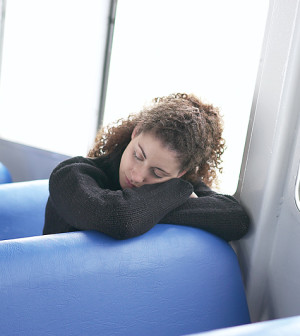- 10 Strategies to Overcome Insomnia
- Could Artificial Sweeteners Be Aging the Brain Faster?
- Techniques for Soothing Your Nervous System
- Does the Water in Your House Smell Funny? Here’s Why
- Can a Daily Dose of Apple Cider Vinegar Actually Aid Weight Loss?
- 6 Health Beverages That Can Actually Spike Your Blood Sugar
- Treatment Options for Social Anxiety Disorder
- Understanding the Connection Between Anxiety and Depression
- How Daily Prunes Can Influence Cholesterol and Inflammation
- When to Take B12 for Better Absorption and Energy
Sleep Apnea Devices Lower Blood Pressure

For those suffering from sleep apnea, the disrupted sleep and reduction of oxygen getting to the brain can contribute to high blood pressure, but the two common treatments for the condition both lower blood pressure, Swiss researchers report.
A comparison of the treatments — continuous positive airway pressure (CPAP) and mandibular advancement devices (MADs) — showed that each produces a modest reduction in both systolic and diastolic blood pressure rates, the researchers found.
“CPAP and MADs not only reduce symptoms of obstructive sleep apnea such as sleepiness, but also lower blood pressure,” said lead researcher Dr. Malcolm Kohler, chair of respiratory medicine at the University Hospital of Zurich.
“Both treatments have similar positive effects on blood pressure, but the treatment effect of CPAP seems to be larger in patients who have more hours of sleep,” he said.
According to the U.S. National Heart, Lung, and Blood Institute, sleep apnea is a common and chronic condition in which breathing stops or becomes shallow during sleep. Breathing pauses can last from a few seconds to minutes and can occur 30 or more times an hour.
Sleep apnea is the leading cause of excessive daytime sleepiness, and can cause high blood pressure, which raises heart disease risk, the agency says.
Mandibular advancement devices work by pushing the jaw and tongue forward to keep the airway open during sleep. In continuous positive airway pressure, patients wear a face mask hooked up to a device that produces mild air pressure to keep the airway open.
Some patients find it difficult to adapt to CPAP, Kohler said. Some have problems wearing the face mask, others can’t get used to the noise of the compressor and some can’t abide either.
“MADs are to be considered as an alternative treatment to the more widely used CPAP, especially in patients who fail to adapt to CPAP treatment,” Kohler added.
The report was published Dec. 1 in the Journal of the American Medical Association.
For the study, Kohler and colleagues looked at the ability of CPAP and MADs to lower blood pressure in 51 previously published studies that included a total of nearly 5,000 patients.
In this type of study, called a meta-analysis, researchers use previously published data to try to find consistent patterns across all the reports.
They found that CPAP was associated with a reduction in systolic blood pressure (top number of a reading) of 2.5 mm Hg and a reduction of 2.0 mm Hg in diastolic blood pressure (bottom number).
MADs were associated with a reduction in systolic blood pressure of 2.1 mm Hg and 1.9 mm Hg in diastolic blood pressure, the researchers reported.
Although no statistically significant difference between CPAP and MADs in lowering blood pressure was found, CPAP was more likely to have a strong association with lowering systolic blood pressure, Kohler said.
Dr. Preethi Rajan, an attending physician in the department of pulmonary, critical care and sleep medicine at North Shore-LIJ Health System in Great Neck, N.Y., said the new study “confirms what we know — that both treatments can reduce blood pressure.”
Even though CPAP appears more effective, MADs can be a good alternative for some patients, she said.
“CPAP is the tried-and-true method of treating sleep apnea and it’s effective across the whole spectrum of severity,” Rajan said. “MADs tend to work better in mild to moderate sleep apnea. They may not be good enough for severe sleep apnea.”
Rajan said that the reductions in blood pressure seen with both devices were modest. Patients with high blood pressure and sleep apnea will need to have their blood pressure controlled with medication, she said.
More information
For more information on sleep apnea, visit the U.S. National Heart, Lung and Blood Institute.
Source: HealthDay
Copyright © 2026 HealthDay. All rights reserved.










